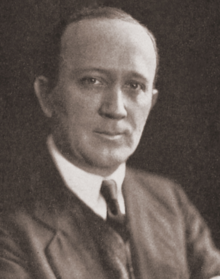William Z. Foster
| William Z. Foster | |
|---|---|
 |
|
| Chairman of the Communist Party USA | |
|
In office 1945–1957 |
|
| Preceded by | Earl Browder |
| Succeeded by | Eugene Dennis |
|
In office 1924–1934 |
|
| Preceded by | Office established |
| Succeeded by | Earl Browder |
| Personal details | |
| Born |
William Edward Foster February 25, 1881 Taunton, Massachusetts |
| Died | September 1, 1961 (aged 80) Moscow, Soviet Union |
| Occupation | trade union leader |
William Z. Foster (February 25, 1881 – September 1, 1961) was a radical American labor organizer and Marxist politician, whose career included serving as General Secretary of the Communist Party USA from 1945 to 1957. He was previously a member of the Socialist Party of America and the Industrial Workers of the World, leading the drive to organize the packinghouse industry during World War I and the steel strike of 1919.
He was born William E. Foster in Taunton, Massachusetts on 25 February 1881, the son of a Fenian, James Foster, who had fled County Carlow after the failure of the revolutionary Fenian Rising in Ireland and the waves of arrests that drove hundreds of others out of the country. His mother, Elizabeth McLoughlin, was an English Catholic textile worker. During his peripatetic childhood his mother had nine surviving children of 23 babies she bore.
His family moved to the Irish area of Skittereen in Philadelphia, where his father worked as a stableman and was part of a group of Irish-American Fenians. Foster left school at the age of ten to apprentice himself to a die sinker. Foster left that position three years later to work in a white lead factory. Over the next ten years he worked in fertilizer plants in Reading, Pennsylvania and Jacksonville, Florida, as a railroad construction worker and sawmill employee in Florida, as a streetcar motorman in New York City, as a lumber camp and longshoreman in Portland, Oregon and as a sailor. Foster even homesteaded for a year in Oregon in 1905, although he also worked a series of odd jobs as a miner, sheepherder, sawmill worker and railroad employee during that year before abandoning the farm.
...
Wikipedia
